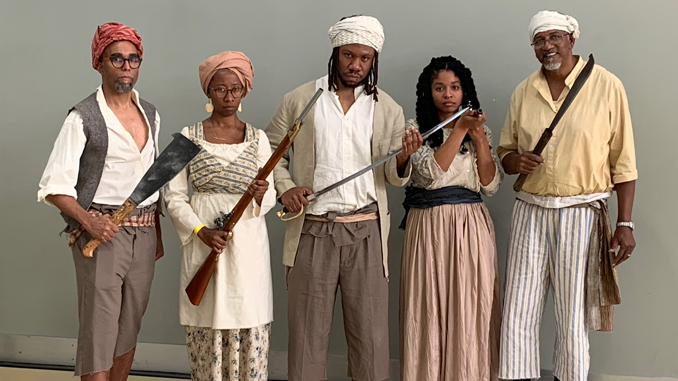
Leon A. Waters
Chair of the Louisiana Museum of African-American History, and Manager of Hidden History Tours
This January 12, 2019 marked the 208th Anniversary of Louisiana’s Heroic 1811 Slave Revolt and the restart of its public commemoration. Before 2005, Hurricane Katrina, annual public commemorations were once organized by Leon A. Waters and Malcolm Suber. The Louisiana Museum of African- American History in partnership with community organizations, performing artists, historians, activists, and small vendors convened this year’s event. Over 200 participants attended which included presentations from Marie-Helene Leotin, historian and author from Martinique; Bayyinah Bello, educator and anthropologist from Haiti; Mark Roudane’, public lecturer and author from St. Paul, Minnesota; and Titos Sompa and Co., master dancer and drummer from the Kongo.
A very exciting feature of the celebration was the call to join the Slave Revolt Reenactment by its artistic organizer, Dread Scott. The SRR will be a two-day reenactment of the 1811 Slave Revolt along the River Road in St. Charles and St. John the Baptist Parishes in November 2019.
This revolt was the largest slave uprising in the History of the U.S.A. involving over 500 people.
It was led by a man named Charles, a laborer on the Deslondes Plantation. The revolt began on the evening of January 8th when slaves led by Charles and his lieutenants rose up near the Plantation of Col. Manuel Andry, which was located about 50 miles north of New Orleans. They overwhelmed their oppressors. Armed with cane knives, axes, machetes and some firearms, the rebels marched down the River Road towards New Orleans. Their slogan was “On to New Orleans” and “Freedom or Death!” They gained in number as they moved from plantation to plantation on the East Bank of the river, traversing about 28 miles between the towns of LaPlace and Kenner. They were intent on creating a slave army, capturing the City of New Orleans, Capital of Orleans Territory, and establishing an independent Black Republic from which they would liberate the tens of thousands of slaves held in bondage in the territory of Orleans.
However, despite their best efforts, they were not able to succeed. The revolt was put down by January 11th and many of the leaders and participants were killed by slave owner’s militia and the U.S. Federal Troops. Some of the leaders were captured, charged with the crime of insurrection, placed on trial, found guilty and executed. Their heads were cut off and placed on poles along the River Road for 60 miles in order to frighten and intimidate the other enslaved.
Yet the sacrifice of these brave men and women were not in vain. The revolt reasserted their humanity and redeemed the honor of their people. The uprising weakened the System of Chattel Slavery, stimulated more revolts in the following years and set the stage for the final battle, the Civil War (1861- 1865) that put an end to this horrible system.
These were people of exceptional courage, valor and dedication; they understood the principle that the emancipation of the masses precedes the emancipation of the individual.
It is only fitting that we show our appreciation for these men and women who represented the best qualities of humanity. You, the reader, are invited to sign up and join the Slave Revolt Reenactment. Contact Malcolm Suber, Outreach Coordinator @ 504-931-7614 or Malcolm.sbr1@gmail.com
Leon A. Waters, Chair of the Louisiana Museum of African-American History, and Manager of Hidden History Tours: www.HiddenHistory.us or 504-432-9901
Recommended For You.



Be the first to comment